Standards Board
-
- Financier Calls for a New Approach on Standards Maritime Reporter, Oct 2003 #26
Calls for a new Maritime Standards Board came from ship financier Paul Slater, speaking at the Maritime London event. Addressing the IMarEST and RINA debate on the single / double hull issue. Slater said that there is no standard established for the design, construction and operation of double-hulled tankers. "One cannot build a factory or an apartment building or a truck or even a container without meeting standards established by the government or local authority in which they are to be built or operated", he said. "It is the absence of enforceable standards in the shipping industry that is the root cause of many of its problems." A new Maritime Standards Board would gather all the necessary information, which already exists within classification societies, to establish new standards which would then be presented to the IMO for adoption by maritime governments, he suggested. Class would then be appointed by the new Board to make sure that shipowners and shipbuilders conformed to the standards during construction, and subsequently through the working life of a vessel.
Slater warned the gathering that moving from single to double hulled tankers without establishing proper standards for new designs may well be increasing the problems of pollution by creating greater safety risks in the future.
By establishing standards that would have the force of law. he said, the whole process of ship inspection becomes more straightforward. Class becomes an instrument of all maritime governments and applies a uniformity.
Other speakers had warned of the problems of corrosion in double hull spaces. These inaccessible areas, delegates were told, were ideal breeding grounds for fast-track corrosion, particularly aboard vessels where there was a large temperature difference between heated cargoes on board and sea water outside the hull. Such a temperature gradient would lead to substantial condensation, another corrosion catalyst.
Early double hull tanker designs were at significant risk, it was agreed. "The early generation of post OPA 90 tankers are now entering the second half of their useful lives". Slater said, noting that many of them are now owned by spot market traders whose operating budgets are more limited than the major owners or oil companies and whose vessels therefore face higher risk from corrosion or structural failure. Slater, who often draws parallels between shipping and aviation, asked delegates if they would even consider flying in an airplane for which no prototype had been built and tested. Shipping should follow aviation's model with maritime nations setting the standards by which all ships would be measured and port state control would then be better able to enforce the standards.
"Shipyard guarantees could then be demanded for longer periods than are available at present and the substandard operators would be more clearly identified," he said.
-
- Overseas Shipholding Group Reports Increased Earnings Maritime Reporter, Sep 1978 #60
and $23,211,000, or $2.12 per share, in the first half. The 1978 results reflect the accounting for leases prescribed by Financial Accounting Standards Board Statement No. 13, and 1977 results have been adjusted accordingly. The U.S. tax provision for each period is net of applicable investment tax
-
- Three Sheets to the Wind: Three Key Ingredients of the Sober Financial Statement Marine News, Mar 2013 #28
although many countries are beginning to embrace International Financial Reporting Standards (IFRS) maintained by the International Accounting Standards Board. All European Union countries, Canada and Taiwan follow such standards. Companies report their results at regular intervals, usually quarterly
-
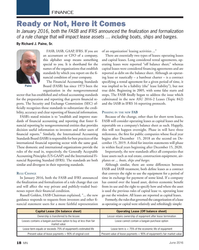 )
June 2016 - Marine News page: 18
)
June 2016 - Marine News page: 18. Phase in will have three ? nancial reports.” Similarly, the International Accounting milestones, the ? rst for public companies whose ? scal year Standards Board (IASB) is responsible for best practices of the begins after December 15, 2018 an the second on De- international ? nancial reporting sector
-
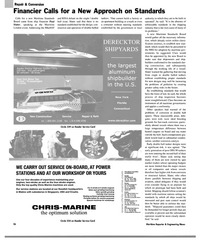 )
October 2003 - Maritime Reporter and Engineering News page: 28
)
October 2003 - Maritime Reporter and Engineering News page: 28, he said. "It is the absence of enforceable standards in the shipping industry that is the root cause of many of its problems." A new Maritime Standards Board would gather all the necessary informa- tion, which already exists within classi- fication societies, to establish new stan- dards which
-
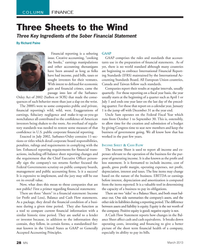 )
March 2013 - Marine News page: 28
)
March 2013 - Marine News page: 28although many countries are beginning to embrace International Financial Report- ing Standards (IFRS) maintained by the International Ac- counting Standards Board. All European Union countries, Canada and Taiwan follow such standards. Companies report their results at regular intervals, usually quarterly
-
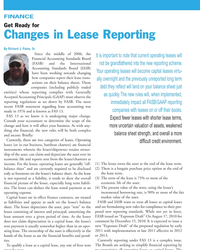 )
December 2010 - Marine News page: 22
)
December 2010 - Marine News page: 2222 MN December 2010 FINANCE Since the middle of 2006, the Financial Accounting Standards Board (FASB) and the International Accounting Standards Board (IASB) have been working towards changing how companies report their lease trans- actions on their balance sheets. Those companies (including
-
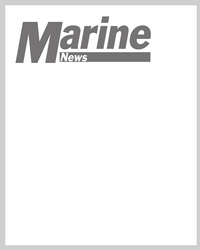 )
January 2008 - Marine News page: 27
)
January 2008 - Marine News page: 27for another length of time. Leases may be treated differently for accounting and tax purposes. If the lease is in compliance with Financial Accounting Standards Board (FASB) 13, it can be treated as an operating lease or "off-balance sheet." Operating leases must contain no automatic transfer of ownership and
